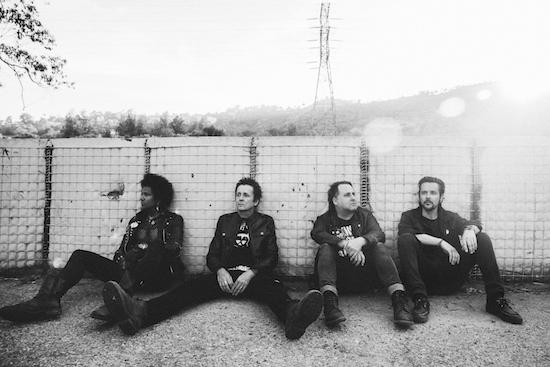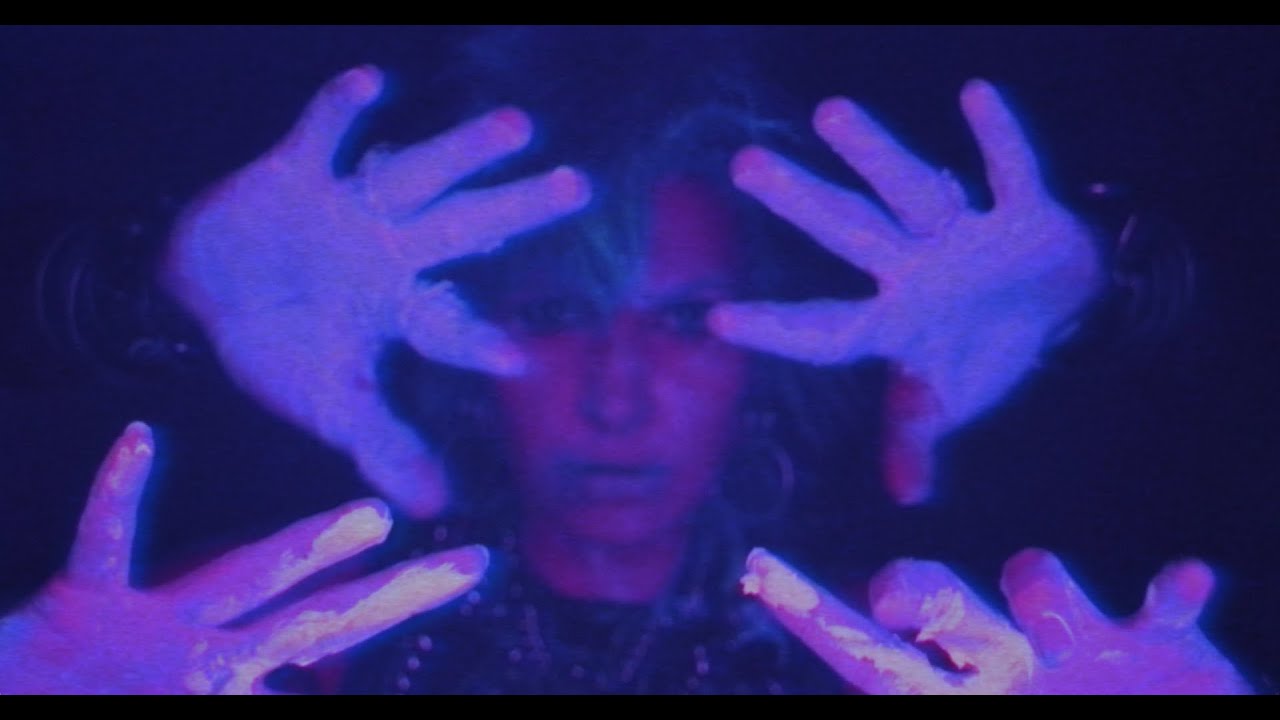Band portrait by Michelle Shiers
Picture, if you will, a 1980s parallel universe where Killing Joke frontman Jaz Coleman, moving swiftly north in an attempt to avoid the oncoming apocalypse, finds himself derailed from making it to his original destination, Iceland. Instead, by some strange quirk of fate – a miscast spell, perhaps, or having accidentally bought a wrong ticket whilst in the grip of some savage LSD trip – he finds himself stranded in Keighley, West Yorkshire. And it’s there that he hijacks the nascent Skeletal Family to position himself as their singer in place of potential chanteuse Anne-Marie Hurst, who is dispensed with during a blood ceremony that goes horribly wrong.
If your imagination is running with this alternative reality, then the sound this band is making isn’t far from the darkness that’s currently emanating from the west coast climes of Los Angeles in the shape of The Wraith. Formed in 2016 by singer Davey Bales and guitarist Kaz Alvis, The Wraith’s line-up is completed by British bassist Paul Rogers and Belgium drummer Jef Pauly, and the driving, swirling noise that they’re creating will strike a chord of recognition for those still lamenting the day goth discovered classic rock and heavy metal in 1985, while appealing to those who like their music shrouded in shadows, tall trees and eldritch atmospherics.
But hold on a second! Tribal drums, bass lines played up the neck and scything guitars eschewing blues-based tropes all bolstering examinations of inner darkness from Los Angeles? Is that right?
“Well, it is raining here today!” laughs guitarist Kaz Alvis as he speaks to tQ via Skype.
As evidenced by their brilliantly infectious debut album, Gloom Ballet, The Wraith are, in reality, continuing a lineage of west coast darkness that stretches back to the 60s. For all of its reputation of the City of Angels, bands such as The Doors and Love though to punk’s first snotty blast with The Germs and the dark decadence at the heart of the 80s hair metal scene have undermined that view with music and behaviour that’s gone straight to the heart of darkness.
“That’s how it is here,” says Alvis. “But it is kinda weird, given the beaches and the sun, but then again, LA hasn’t always been a pretty place. There are still some dangerous spots, but it was a lot nastier in the past and that produced a lot of dark bands.
“But I guess we do see ourselves as continuing with that dark tradition of bands that have come from here. Davey’s a huge Doors fan and grew up with their poetry, whereas I’m really into a lot of those 70s LA punk bands. I think we fit into all of that.”
By Alvis’ admission, The Wraith’s rise has been almost accidental. Having bonded with Davey Bales over a shared love of dark punk, the pair began writing and recording demos that found an audience far quicker than anticipated.
“We put the demos online and then people were, like, hitting us up for shows; radio stations were then emailing us, as were labels. And we were, like, ‘But we’re not even a real band!’ So we started to reach out trying to find people. We had a lot of crazy and insane people then pass through the band until we got the right bandmates.”
The Wraith’s viral popularity found the band fielding some 30 record label offers before finally signing to Southern Lord Recordings after they came to the attention of the label’s head and Sunn O))) guitarist Greg Anderson.
“Because we had some label offers, I found an attorney through a friend,” recalls Alvis of the Southern Lord deal. “I sent him a couple of contracts and he considered them to be like contracts from the 70s that just tried to own everything. He then shopped us around to see what he could get. He sent it to Southern Lord and Greg Anderson was already aware of us. We met up with him and he was a really cool guy.”
Elaborating further, he continues: “See, you’d meet the other labels and the first thing they’d ask would be, ‘Do you have an attorney?’ and they’d try to lock us in, but with Greg, we out for dinner and we just nerded out about music. He’s the fun part of the music industry and we just connected. He gave us some money for the recording and he had this amazing distribution and his roster of bands is pretty awesome.”
Yet for all that, The Wraith are driven by a sense of independence. Taking matters in to their own hands, the band’s hands-on approach has seen them taking charge of any number of aspects ranging from making their own merchandise, writing press releases, mastering editing software to make videos and staging a festival to showcase not just their talents but also those of a shared aesthetic, which included former Christian Death guitarist Rikk Agnew among others.
“We’d talked for a long while about putting together a one-day event together and we finally did it and it fell together pretty quick,” says Alvis of the inaugural LA Dark Fest that took place in the summer of 2019. “It took a lot more work than I thought it was going to be, but it oversold and was hugely successful. The venue wanted us to do it once a month, but I was like, ‘Absolutely not!’ But I’ll do it once a year.’ People flew in from all over the country for it.”
So are The Wraith overstretching themselves?
“It’s nice to be hands-on,” reasons Alvis. “I’m working on screen-printing merch and the band website as well as writing the music. It would be nice to just concentrate on the music, but in this day and age you can’t really do that.”
And with that, we bid our farewells as Alvis and his bandmates return to plotting the next stage of their inexorable rise. Spreading like a virus, The Wraith are blotting out the Californian sun and drawing a veil in all directions. You’d be well advised to wrap yourself up for the long nights ahead.



